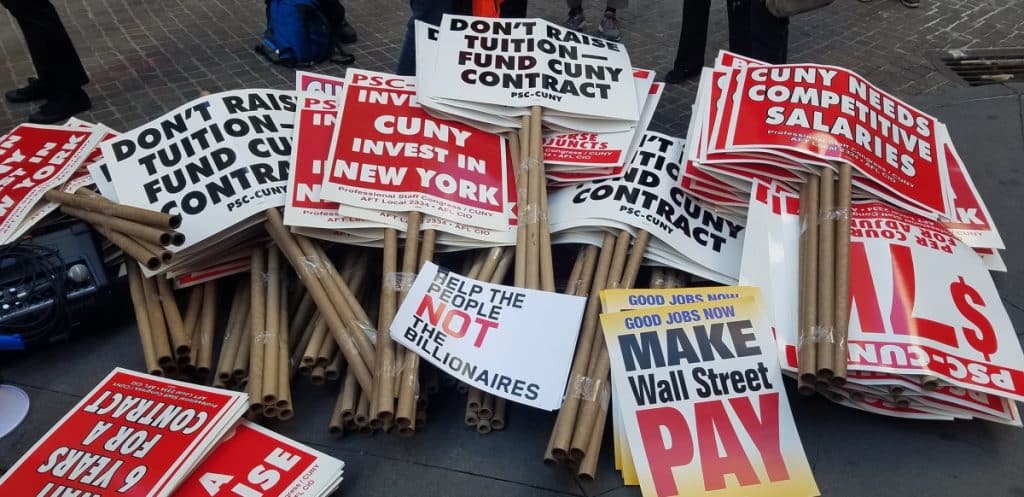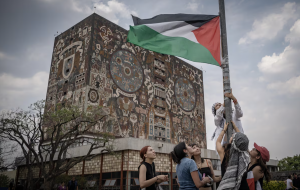As a CUNY adjunct starting this semester without a contract, I am filled with anger, terror, and excitement — a mix of reactions I’ll try to explain here. My anger predates our current contract struggle. Having taught at various CUNY campuses over the past six years, I’m furious about adjuncts’ working conditions and the resulting student learning conditions. As underpaid, expendable, and often invisible employees, adjuncts, who teach the majority of classes at the university, often find out our schedules mere days — or even hours — before the semester begins, and we are therefore forced to throw together syllabuses and assignments at the last minute. Even when we know what classes we’re teaching in advance, the necessity of shuttling between different campuses and universities to make ends meet reduces the amount of attention we can give our students. This fall, I am teaching two English writing classes at York College and one at Baruch College, and I am also working as a teaching assistant at NYU. Semester to semester, I don’t know if I’ll have a job or where that job will be. All around me, I see CUNY’s physical and human infrastructure crumbling, holes in ceilings, vanishing IT departments, woefully understaffed counseling and advising centers, shuttered cafeterias, all while the university’s high-level administrators pay themselves six-figure salaries and give themselves preposterous raises of 20 percent or more. Shame of the Board of Trustees and CUNY Management.
Lacking a contract this fall fills me with terror because under NYS labor law we will continue working under our existing contract until we negotiate a new one with management, and our current adjunct wages are far below the cost of living in NYC, especially with the rampant inflation (about 17 percent since our union’s last contract) and unconscionable rent hikes we’ve seen over the last couple years. The average monthly rent of a one-bedroom in this city is basically what an adjunct makes per three-credit class per semester, after taxes. Teaching the maximum number of classes that a part-timer is allowed — teaching at CUNY full-time part-time, as I like to call it — gets you 10 months of average rent in New York. We don’t make enough to pay average rent for a whole year, let alone pay for food, clothing, and other necessaries. So folks live far away from their jobs with multiple roommates and make sacrifices when it comes to eating healthy, seeking medical care, spending time with friends and loved ones, and in so many other parts of their lives. As an adjunct, I know I’m always one unlucky accident away from being unable to pay my rent or buy food. It’s terrifying. Fortunately, I have parents, grandparents, aunts, uncles, and cousins who could help me out if I needed it. For those teaching without that kind of safety net, I don’t know how they manage.
Despite being angry and terrified, I’m also excited for the months of struggle ahead. Nothing’s meant more to me than getting involved in union organizing over the last year. The comrades I have found at the Graduate Center and throughout the CUNY system give me hope, as do my students, as do the workers in higher education and other sectors who have organized and often gone on strike recently to win incredible gains for themselves and their communities. The private-sector nurses’ strike in NYC (which was followed by pattern-breaking raises for public sector nurses) and the graduate student workers’ strike at the University of California (the largest strike in the history of U.S. higher education) come to mind as particularly salient recent instances. From these examples, we can learn what it will take to transform CUNY for all of us: grassroots militancy, rank-and-file participation, and tireless organizing. I have observed bargaining sessions (members of the CUNY faculty and staff union should sign up to attend), and I have heard what management has to say: the university has no money, it’s not their job to make up for inflation or ensure we’re paid a living wage, it’s not really a big deal that CUNY has a hard time recruiting and retaining Black and Latinx faculty, department chairs shouldn’t be in the union, and every other asinine thing you can imagine. But I do not care what they have to say. I look at the history of this institution and the people around me, and I believe that we have the power to change this university, to win a CUNY that’s completely free for students and that pays all its employees a living wage, a fully funded university with small class sizes and a student-and-justice-centered curriculum, committed to serving, teaching, and learning from every New Yorker and every community in this city. Doing so will require a commitment from all of us (workers, students, and community members) to democratic union organizing in the upcoming contract campaign and in the wider struggle for a People’s CUNY.
Solidarity forever,
Nathan










